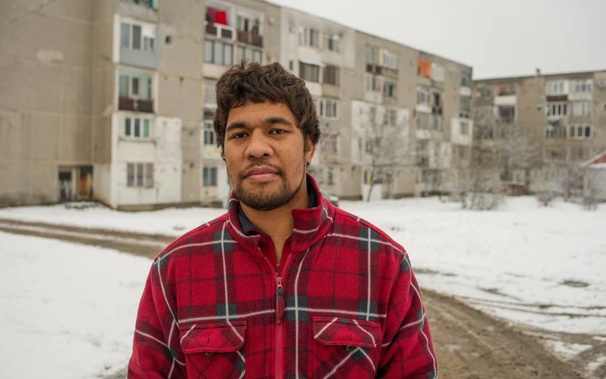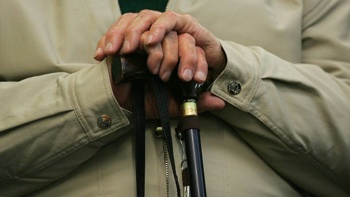
Baia Mare, in the far north of Romania, is a long way from anywhere. Redolent of many concrete-clad former Soviet cities, its notorious claim to fame comes from being the site of Europe's worst ecological disaster since Chernobyl when 100 tons of cyanide-laced sludge was released from a gold processing plant into the River Tisza 17 years ago.
It is an especially long way away from the South Pacific, but this is where Sione Vaiomounga, a flanker who played for Tonga in the 2011 World Cup, has been trapped for the past three years. Vaiomounga is among hundreds of rugby players who leave their homeland every year in search of a professional contract with the potential to change their lives. Some succeed in their ambition, earning long-term financial security for their families. Many others earn just enough to get by. For an unfortunate few, chasing that dream leads to a nightmare from which they cannot escape. This is Vaiomounga's story.
Vaiomounga had never heard of Romania before he signed his first professional contract with Baia Mare in 2014. He hoped it would be a stepping stone to bigger things. His first season was going well. Then the night before a semi-final match, blood started pouring out of Vaiomounga's nose. It wouldn't stop. After the game, his coach took him to hospital. He would remain there for the next three months.
Vaiomounga had suffered kidney failure. At first, Vaiomounga did not really understand the diagnosis. He thought his kidney could be fixed and he would be back playing rugby in no time. Slowly, he learned that there would be no more rugby and that the funny beeping contraption that he came to know as a dialysis machine was now critical to his survival.
That was three years ago and Vaiomounga has been based in Baia Mare ever since. Hospitals in Tonga do not possess the dialysis machines that Vaiomounga needs so he cannot go home. But in three months, Vaiomounga's visa expires and the threat of deportation hangs heavily in the air of his tiny apartment where he lives with his wife, Sala, and his children Jesyda, 3, and Sione junior, 10 months.
"It would be a death sentence if we are told to go back to Tonga," Sala said. "We hope this does not happen, but we just don't know. Not knowing is the worst thing."
Vaiomounga's parents were farmers. He talks wistfully of taro, breadfruit and pig roasts. The food is very different in Romania. So too the weather. In winter it reaches -20C around these parts; the coldest it gets in Tonga is around 15C. The language is even more alien, although he says the people of Baia Mare have been very kind to him.
/arc-anglerfish-syd-prod-nzme.s3.amazonaws.com/public/SXAQZLUNQVCGDLEZQVQMR2QSIU.jpg)
The club did offer some support to Vaiomounga at first. He had signed a three-year contract at around €600 ($1000) a month, the bulk of which he sent home to Sala and his parents. Initially, he was allowed to remain in the club hotel, although he claims his wages were cut by more than 50 per cent. In 2015, Vaiomounga received the gate receipts when Romania played Tonga in a warm-up game for the World Cup, which allowed him to pay for Sala and Jeysda to join him in Romania. "That was the hardest period," Vaiomounga. "For two years I was by myself."
Sala had been planning their wedding in Tonga before Vaiomounga's kidney failure. Instead, they got married in Romania last year. There was no honeymoon. When Sala's initial three-month visa expired, she and Jeysda had to move to Hungary for three months so they could regain entry. It was a process they have since repeated. In between, Sione junior was born in Romania but is not eligible for citizenship.
Their ultimate dream is to attain a visa to either New Zealand or USA, where they have family, but that process is fiendishly complicated. The other dream is to find a kidney donor for Vaiomounga. Three times he has received a call from a hospital in Cluj-Napoca, two hours away, but each time he was not the right match. Chances are he will not be in this part of the world with his A+ blood type.
Despite their desperate situation, the family remain remarkably positive. "As long as we are all together then we are happy," Vaiomounga said. "So many times I want them to go back, but she always says it is better when we are together and she is right."
It is the uncertainty which is so difficult to bear. Their most viable option is to apply for new visas to remain in Romania. They will have the backing of Vaiomounga's doctors, but there is no guarantee that a byzantine bureaucracy will apply any measure of common sense. The last time Sala overstayed her visa by a single day she was fined and ordered to leave Romania immediately.
Vaiomounga's circumstances are unique. There is neither a straightforward solution nor a bad guy to blame for his predicament. As Vaiomounga says, had he not moved he could well have died in Tonga. He says he is lucky. He has heard worse stories among the rugby immigrant community. The Daily Telegraph has previously reported the suicide last year of Isireli Temo, a Fijian prop playing in France, and this month's Rugby World details the alarming death in Japan of Talifolau Takau, a friend of Vaiomounga's, following a match during which he was reported to have suffered a concussion.
These issues are not exclusive to Pacific Island players, although they are disproportionately affected. South Africans and Eastern Europeans are also increasingly victim to the churn of rugby's emerging markets. Organisations such as the International Rugby Players' Association and Pacific Rugby Players Welfare, which has set up a Just Giving Page for Vaiomounga, do their best to pick up the pieces but every week they hear of new desperate cases, far more than they can deal with.
As much as rugby likes to pretend it is one giant family that look after one and other, cases such as Vaiomounga's prove there is no safety net for those who operate on the fringes of an ever-growing economy.
Take your Radio, Podcasts and Music with you









